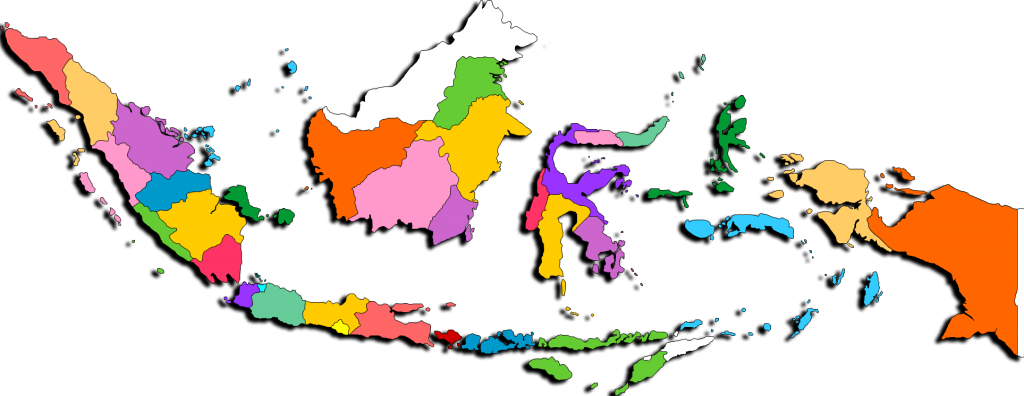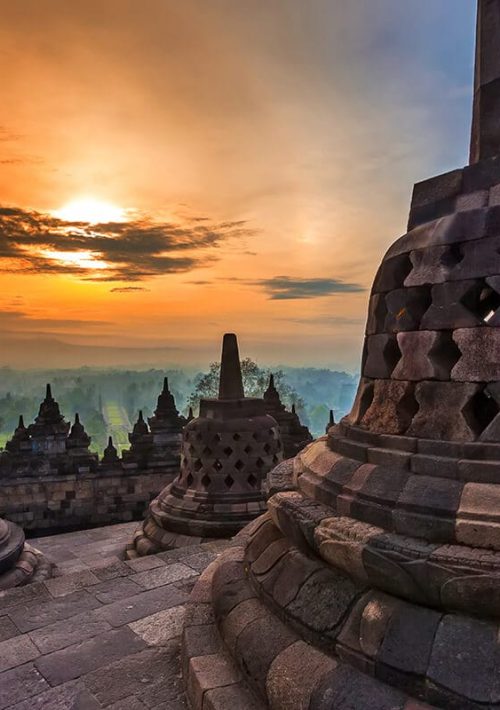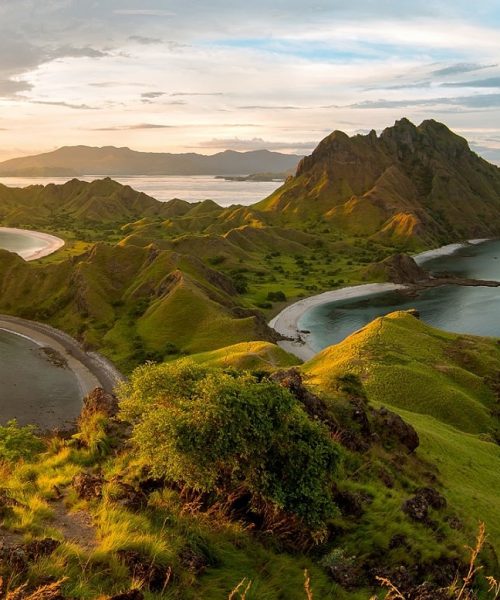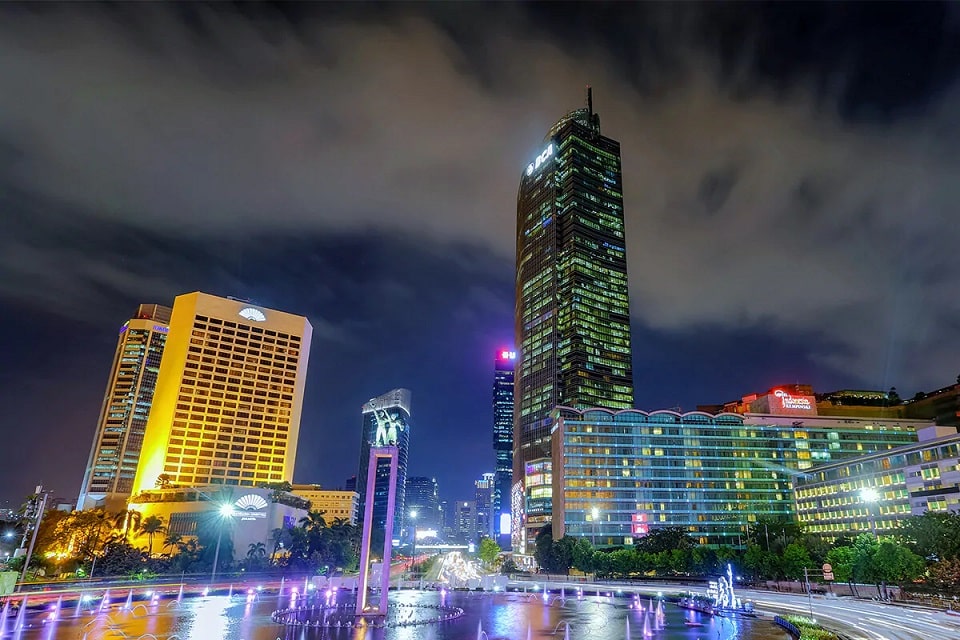Indonesia is the world’s largest archipelago with over 17,500 islands. The country consists of five major islands and about 30 smaller groups which are located across the equator. This largest archipelago is on a crossroads between two oceans, the Pacific and the Indian Ocean, and bridges two continents, Asia and Australia which is extending 5,150 kilometers (3,200 miles) east to west. The territory of the Republic of Indonesia stretches from 6°08′ N latitude to 11°15′ S latitude and from 94°45′ E to 141°05′ E longitude. Total Area of Indonesia is 1,919,440 sq km (Land Area: 1,826,440 sq km; Water Area: 93,000 sq km). Indonesia is a tropical island which has coconut trees, white sand beaches, marine parks, volcanoes, and great adventure from jungles, volcanoes and also sandy beaches. The country is also well-known for its vast mineral, oil, and gas resources, and world famous coffee and tea.
Indonesia is divided into three Standard Time Zones. The first cluster is Sumatra, Java and West & Central Kalimantan which are 7 hours ahead of Greenwich Mean Time (GMT+7). The second one is Bali, Nusa Tenggara, South & East Kalimantan and Sulawesi which are 8 hours ahead of Greenwich Mean Time (GMT+8). The last one is Irian Jaya and Maluku which are 9 hours ahead of Greenwich Mean Time (GMT+9). Indonesia is not only the world’s largest archipelago, but also the world’s fourth most populace country. Its wide diversity is reflected by a total population of around 250 million people from more than 200 ethnic groups speaking more than 300 different languages. The official language in Indonesia is Bahasa Indonesia. In this country, there are five official religions which are Muslims (more than 80%), Christians, Catholics, Hindus, and Buddhists. The official language in Indonesia is Bahasa Indonesia.
Economy of Indonesia is mainly based on agriculture and oil. Approximately 90% of the population is engaged in agriculture. As a country which is located in tropical area, Indonesia has extensive natural resources, including crude oil, natural gas, tin, copper, and gold. This country is also famous for the handicraft products. Common handicraft practices here are: woodcarvings for ornamentation and furniture, silverwork and engraving from Yogyakarta and Sumatra; filigree from South Sulawesi and Bali with different styles of clay, sandstone and wood sculptures. Batik fashion which is famous in the world is originated from Indonesia. Several popular Batik centers in Indonesia are located in Jogjakarta, Surakarta, Pekalongan and Cirebon.
In the past few years, the Meetings, Incentives, Conventions and Exhibition (M.I.C.E) industry in Indonesia has grown significantly. With the fact that Indonesia is the largest and most populous country in Southeast Asia and the dynamic economic development in the country, it is becoming a very attractive market to the international world. With the constant growth, Indonesia is rapidly rising into Southeast Asia’s largest economy.

History
The history of Indonesia can be marked as the dawn of mankind since it is where the remains of the early man were unearthed. During the ancient age of kingdoms and empires, Indonesia saw the rise of the great empires that ruled over almost all of South-East Asia and regarded to play a key role in the history of the region. After gaining independence from foreign colonization and the wave of both World Wars, Indonesia emerged as one united country and continued to thrive amongst the top nations of the world to this very day.
Language
What is the main language of Indonesia?
Bahasa Indonesia is the national and official language of Indonesia and is used in the entire country. It is the language of official communication, taught in schools and used for broadcast in electronic and digital media. Most Indonesians also have their own ethnic language and dialect, with the most widely spoken being Javanese and Sundanese. Some ethnic Chinese communities continue to speak various Chinese dialects, most notably Hokkien in Medan and Teochew in Pontianak.
Currency
What is the currency of Indonesia?
The official currency of Indonesia is Rupiah which is Issued and controlled by the Bank of Indonesia. The currency code for Rupiahs is IDR, and the currency symbol is Rp. By law, all transactions are required to be conducted in rupiah, and information on the daily exchange rate can be found in newspapers or from the internet and online apps. Credit cards are widely accepted in hotels, large restaurants, and large stores. Indonesian banknotes come in denominations of IDR1000, IDR2000, IDR5000, IDR10000, IDR20000, IDR50000, and IDR100000. Coins in circulation include IDR1000, IDR500, IDR200, IDR100, and IDR50.
Time Differences
All You Need to Know About Indonesia’s Time Zones
As a massive archipelago, it is understandable that Indonesia has different time zones in its territory. There is the Indonesia Western Standard Time (WIB), Indonesia Central Standard Time (WITA), and Indonesia Eastern Standard Time (WIT). So what are these time zones and how do you calculate the differences from all over the world?
Weather, Climate & Seasons
What is the weather like in Indonesia?
The climate of Indonesia is almost entirely tropical. The uniformly warm waters that make up 81% of Indonesia’s area ensures that temperatures on land remain fairly constant, with the coastal plains averaging 28 °C, the inland and mountain areas averaging 26 °C, and the higher mountain regions, 23 °C. Temperature varies little from season to season, and Indonesia experiences relatively little change in the length of daylight hours from one season to the next.
People & Culture
What are the different ethnic groups in Indonesia?
Living on more than 13,400 islands, the Indonesian nation today counts some 200 million population comprising over 200 ethnic groups with their own languages and dialects that range in population from the Javanese (about 70 million) and Sundanese (about 30 million) on Java to peoples numbering in the thousands on remote islands. After gaining Independence in 1945, inter-marriages among people of different ethnic groups have welded the population into a more cohesive Indonesian nation.
Staying Safe in Indonesia
How do I make calls in Indonesia using a landline?
Telephone numbers in Indonesia have different systems for landlines and mobile phones: landlines use area codes, while mobile phones do not. For landline area codes, the digit “0” is added in front when dialing domestic long distance from within Indonesia, but is always omitted when calling from abroad. Instead, callers would use the Indonesian country code +62, followed by the area code, without the “0”. To make a phone call to Indonesia from abroad via landlines, callers dial +62, followed by the area code and subscriber’s number, omitting the ‘0’. For calls to mobile wireless phones (GSM) from abroad, callers dial +62, followed by the subscriber’s number, omitting the ‘0’.
WiFi & Connectivity
In this digital era, staying connected is an everyday need, anytime, anywhere. Whether it’s for business-related matters, keeping in touch with loved ones, updates in current issues or traveling pleasures, having an accessible online connection is a necessity. In Indonesia, the Wi-Fi connection is available in many major public areas. Here is some useful info on Wi-Fi accessibility throughout public spaces in Indonesia.
Plugs & Electricity
A Guide to Plugs and Electricity in Indonesia
Charging your phone, laptop and other important gadgets is essential, especially during trips like this. For your trip to Indonesia, understand that plugs and electricity in Indonesia might differ from one back home. So what do you need in Indonesia? An adapter? A voltage converter? Maybe both. Check it out below!
Credit Card
In recent years Credit and Debit Cards have been commonly used as a method of payment in Indonesia. Indonesian people especially living in major cities have opted to bring less cash at hand and use Credit or Debit Cards for practical and convenient reasons. So foreigners traveling to Indonesia need not worry to use credit or debit cards for your traveling pleasure.
Local Law
When visiting other countries, it is customary to pay close attention to the local laws that apply, Indonesia is no exception. As a country of diversity with an abundance of different cultures, laws, and customs to honour, respect and comply with, travellers who plan to visit Indonesia must follow these local laws & customs to avoid any trouble or mishaps.
MORE INFORMATION VISIT
© source: indonesia.travel|| windows10spotlight.com





